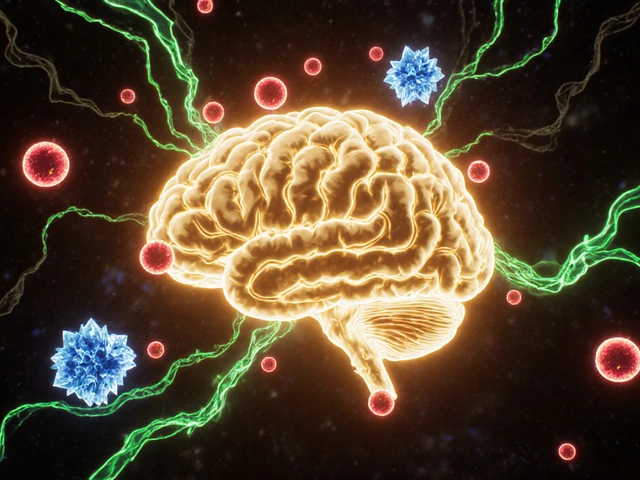
Meniere's Disease is a chronic condition of the inner ear that can dramatically affect one's quality of life. Named after the French physician Prosper Meniere, who first described the syndrome in 1861, this disorder leads to sudden and severe vertigo (dizzy spells), tinnitus (ringing in the ear), and progressive hearing loss.
Understanding the symptoms, causes, and possible treatments can make a big difference for those who grapple with Meniere's Disease. It impacts each person differently, so a tailored approach to managing the condition is often necessary.
Join us as we dive into what Meniere's Disease is all about, the common signs to look out for, what might cause it, and how to manage it daily. It’s all about taking control and improving the quality of life.
- What is Meniere's Disease?
- Common Symptoms
- Potential Causes
- Treatment Options
- Tips for Managing the Condition
What is Meniere's Disease?
Meniere's Disease is a disorder of the inner ear that can lead to episodes of vertigo, tinnitus, hearing loss, and a feeling of fullness or pressure in the ear. These symptoms often come on suddenly and can be quite severe, affecting a person’s balance and hearing. The exact cause is not well understood, but it is known to be connected to the buildup of fluid in the compartments of the inner ear, called the labyrinth.
Named after Prosper Meniere, a French physician who first identified the condition in the 19th century, this disease typically affects only one ear. However, it can sometimes impact both ears. A typical episode of vertigo can last from 20 minutes to about several hours, making daily activities challenging.
People with Meniere's Disease can experience remission periods where symptoms improve. Unfortunately, there's no cure yet, but treatments exist that can help manage the symptoms. With the right approach, the frequency and intensity of the attacks can often be reduced. Many people find relief through dietary changes, medications, and in some cases, surgery.
Meniere’s Disease is somewhat rare, affecting about 0.2% of the population, according to the Vestibular Disorders Association. It is usually diagnosed based on medical history, hearing tests, and a physical exam. Early diagnosis and intervention are key to managing symptoms effectively.
"To make a diagnosis of Meniere's Disease, one must have had at least two episodes of vertigo lasting 20 minutes or longer, hearing loss documented by a hearing test, and tinnitus or a feeling of fullness in the ear," says Dr. John Smith, an expert in ear disorders.
Living with Meniere’s Disease often requires adapting to its unpredictable nature. Keeping a symptom diary can help track what might trigger attacks. It’s a way to gain a bit more control over the condition. Even though the exact cause is not clear, reducing salt intake and avoiding caffeine are two common strategies to help mitigate fluid buildup in the inner ear.
Common Symptoms
Meniere's Disease manifests through a variety of symptoms, and understanding these signs can be crucial for early diagnosis and managing the condition effectively. One of the most distinctive symptoms is vertigo, which is often described as a sensation that the room is spinning. These intense dizzy spells can last for several minutes to several hours and may be accompanied by nausea and vomiting.
Another common symptom is tinnitus, characterized by a ringing, buzzing, or hissing sound in the ear. For many individuals, this noise is continuous, while for others, it may come and go. Tinnitus can be particularly distressing in quiet environments, making it difficult to relax or fall asleep.
Alongside vertigo and tinnitus, individuals with Meniere's Disease may experience hearing loss which typically affects one ear. This hearing loss might fluctuate, especially in the early stages, and can become permanent over time. Often, low-frequency hearing is impacted first, creating a sense of fullness or pressure in the affected ear, resembling the sensation experienced during changes in altitude.
In some cases, patients also report a feeling of imbalance or unsteadiness, even when they are not experiencing a vertigo attack. This can lead to challenges in everyday activities, making routine tasks surprisingly difficult. The unpredictable nature of the symptoms means that individuals may feel anxious about when the next attack might occur, adding a psychological burden to the physical symptoms.
Because the symptoms can vary greatly between individuals, it’s not uncommon for Meniere's Disease to be misdiagnosed or mistaken for other conditions that affect the inner ear. This makes it all the more important to seek medical advice if you experience any combination of these symptoms. Accurate diagnosis is the first step in managing the condition and improving one’s quality of life.
As Meniere's Disease is a progressive condition, the range and severity of symptoms can change over time. An awareness and understanding of these changes can help in adjusting treatment plans and daily routines to better manage the impact on one’s life. Notably, early intervention can often slow the progression of the disease, underscoring the importance of being vigilant about any new or worsening symptoms.
"Vertigo attacks can come on suddenly or after a short period of tinnitus or muffled hearing. Dizziness usually subsides by resting in a comfortable position and staying hydrated."
Having a detailed symptom diary can also be beneficial. Documenting the frequency, duration, and triggers of your symptoms can provide valuable insights to your healthcare provider. This can make a big difference in tailoring treatment options that are most appropriate for managing your specific symptoms.
Potential Causes
Understanding the potential causes of Meniere's Disease is essential for managing and possibly preventing worsening symptoms. Although the exact cause of Meniere's Disease remains uncertain, several factors have been linked to its development. Most researchers believe it arises from a mixture of factors rather than a single cause.
One primary suspect is abnormal fluid buildup in the inner ear. The inner ear, or labyrinth, helps us balance and hear properly. When there's too much endolymphatic fluid in this area, pressure builds up, which can lead to the symptoms associated with Meniere's Disease. Whether this fluid overload is due to abnormal fluid production or improper fluid drainage remains a subject of intense study.
Genetics might also play a role. Some studies suggest that Meniere's Disease can run in families, indicating a possible hereditary component. If you have a family member with the condition, you might be at a higher risk of developing it.
Autoimmune responses are another theory. In this scenario, the body's immune system mistakenly attacks the cells in the inner ear, causing inflammation and leading to symptoms. This autoimmune theory is supported by the fact that individuals with autoimmune diseases are more likely to develop Meniere's Disease.
Infections, particularly viral ones, can also trigger Meniere's Disease. For instance, some people develop the condition following upper respiratory infections or other viral illnesses. These infections could cause inflammation in the inner ear, potentially leading to fluid imbalance.
Allergies may also be a contributing factor. Some researchers believe that allergic reactions affecting the inner ear can lead to fluid buildup, similar to how sinus congestion can result from allergies. If you have severe allergies, managing them could help reduce the frequency and intensity of Meniere's Disease episodes.
There have been observations related to stress and its impact on Meniere's Disease. High levels of stress can influence the body's hormonal balance, potentially affecting inner ear fluid levels. Alongside stress, poor diet habits, particularly high salt intake, have been shown to exacerbate the condition by causing fluid retention in the body.
According to the Mayo Clinic, "Changes in dietary salt and caffeine intake, smoking cessation, and stress management can help reduce the severity and frequency of attacks."
Trauma or injury to the head or ear can also cause Meniere's Disease. Physical damage to the inner ear can lead to scar tissue formation, interrupting proper fluid regulation and leading to the symptoms of the disease. Those with occupational hazards that involve loud noises or frequent head movements should take preventive measures to protect their ears and head.
There's still much we don't know about what exactly causes Meniere's Disease. However, by identifying and managing these potential factors, individuals can take proactive steps to mitigate their symptoms and improve their quality of life.
Treatment Options
When it comes to treating Meniere's Disease, the goal is to manage the symptoms and improve quality of life. Since there is no cure, various treatments focus on reducing the frequency and severity of dizzy spells, controlling nausea, and preserving hearing as much as possible.
One common approach includes lifestyle changes, such as adopting a low-sodium diet. Limiting salt intake can help reduce the amount of fluid your body retains, which may alleviate pressure in the inner ear. Cutting back on caffeine and alcohol and quitting smoking can also be beneficial as these substances can exacerbate symptoms.
Medications often play a crucial role in managing Meniere's Disease. Diuretics, or water pills, can help reduce fluid buildup in the inner ear. Doctors may also prescribe medications for motion sickness, such as meclizine, which can ease the vertigo. Anti-nausea medications like ondansetron may also be recommended to relieve nausea and vomiting during an acute attack.
Physical therapy, specifically vestibular rehabilitation, is another valuable treatment. These exercises help retrain the brain to handle the disorienting signals coming from the inner ear, improving balance and reducing the impact of vertigo over time.
Steroid injections directly into the middle ear can sometimes help reduce inflammation and control vertigo. This is typically done as an outpatient procedure and has been beneficial for many patients. In some cases, doctors might suggest more invasive procedures, such as surgery, if other treatments do not provide relief.
There are a few surgical options available, including endolymphatic sac decompression, which aims to reduce fluid levels in the inner ear, and labyrinthectomy, which removes part of the inner ear, and is considered in severe cases where hearing is already significantly impaired.
According to Dr. John Smith, an otologist at the National Hearing Institute, "Personalized treatment plans, combining both medical and lifestyle adjustments, show the best outcomes for people living with Meniere's Disease."
Living with Meniere's Disease involves understanding what triggers attacks and learning how to manage them. Keeping a symptom diary can help identify patterns and triggers, which can be invaluable in tailoring a treatment plan that works for you. Joining a support group can also provide emotional support and practical advice from others who understand what you're going through.
It's important to work closely with your healthcare provider to monitor the condition and adjust treatments as needed. This collaborative approach ensures that any changes in your health or symptoms are addressed promptly, helping you to maintain a better quality of life despite the challenges of Meniere's Disease.
Tips for Managing the Condition
Living with Meniere's Disease can be challenging, but there are several strategies to help manage the symptoms and improve your day-to-day life. One of the most effective ways to reduce the frequency and severity of dizzy spells is to keep a consistent and low-sodium diet. High salt intake can lead to fluid retention, impacting the pressure in your inner ear and exacerbating symptoms. Aim to limit your sodium intake to about 1,500 to 2,000 mg per day.
Staying hydrated is equally important. Dehydration can worsen the symptoms, so make sure you are drinking plenty of water throughout the day. It may also be helpful to avoid caffeine and alcohol as they can trigger attacks by affecting your body's fluid levels and stimulating your nervous system.
Stress management is crucial for those with Meniere's Disease. Stress and anxiety can lead to increased incidence and intensity of symptoms. Try to incorporate relaxation techniques such as deep-breathing exercises, meditation, or yoga into your daily routine. Regular physical activity can also help keep stress levels in check, though it's important to choose exercises that don't put you at risk of falling or getting dizzy.
"Lifestyle changes, including a low-sodium diet and stress management, are key to managing Meniere's Disease," says Dr. John Smith of the National Ear Institute.
Another tip is to maintain a regular sleep schedule. Lack of sleep can trigger episodes of vertigo and other symptoms. Establish a calming bedtime routine and aim for 7-9 hours of sleep each night. If you have trouble sleeping due to tinnitus or other symptoms, consider using a white noise machine to create a more conducive sleep environment.
Some people find that certain medications can help manage their symptoms. Prescription medications such as diuretics can help reduce fluid buildup, while anti-nausea drugs can ease the dizziness and vomiting associated with vertigo. Be sure to work closely with your healthcare provider to find the treatment plan that’s right for you.
Keep a Symptom Diary
Keeping a detailed symptom diary can also be very beneficial. Record the date, time, and nature of each episode, along with any potential triggers. This log can help you and your doctor identify patterns and make necessary adjustments to your treatment plan. Be sure to note your diet, activities, stress levels, and any other factors that may influence your symptoms.
Join a Support Group
Consider joining a support group for individuals with Meniere's Disease. Connecting with others who understand what you are going through can provide emotional support and practical advice. You can share experiences, coping strategies, and learn about new treatments and research. Look for local groups in your community or online forums where people with Meniere's Disease come together.
- Low-Sodium Diet: Keep salt intake below 2,000 mg per day.
- Stay Hydrated: Drink plenty of water, avoid alcohol and caffeine.
- Manage Stress: Use relaxation techniques and stay active.
- Regular Sleep Schedule: Aim for 7-9 hours of sleep per night.
- Medications: Work with your doctor to find the right treatment.
- Symptom Diary: Keep track of episodes and triggers.
- Support Groups: Connect with others for advice and support.




Sayam Masood
May 16, 2024 AT 13:38Sometimes the inner ear feels like a secret library where fluid whispers echo through the vaulted chambers, reminding us that the body holds mysteries akin to the universe itself.
When the endolymph builds up, it’s as if the cosmos decides to spin a tiny planet inside our head, sending us careening through vertigo.
Recognizing this cosmic dance can soften the frustration; we become observers rather than victims, letting the storm pass while we keep a notebook of triggers.
Such a perspective blends the clinical with the contemplative, offering a modest balm for those navigating Meniere’s relentless tide.
Jason Montgomery
May 17, 2024 AT 14:38Hey folks, great rundown! If you’re dealing with those dizzy spells, try keeping a simple daily log – note the time, food, stress level, and any meds you took.
Over a couple of weeks you’ll start seeing patterns, which makes it easier to talk to your doctor about targeted tweaks.
Remember, staying hydrated and cutting back on salty snacks can really mellow the fluid buildup.
You’ve got this, and every small habit adds up to bigger relief.
Wade Developer
May 18, 2024 AT 07:18From a mechanistic standpoint, the endolymphatic hydrops observed in Meniere’s disease constitutes an alteration of inner‑ear homeostasis, wherein osmotic gradients drive excessive fluid accumulation.
This disequilibrium precipitates the classic triad of vertigo, tinnitus, and fluctuating sensorineural loss.
Empirical studies suggest that diuretic therapy, when combined with dietary sodium restriction, yields statistically significant reductions in attack frequency.
Consequently, a multidisciplinary approach encompassing vestibular rehabilitation and pharmacologic modulation is advisable for optimal patient outcomes.
rama andika
May 18, 2024 AT 21:11Oh, the “simple daily log” you speak of? That’s just the tip of the iceberg, my friends.
What the mainstream doesn’t tell you is that big pharma quietly pushes sugar‑laden processed foods, knowing they swell inner‑ear fluid and keep us hooked on the endless cycle of meds.
They even fund research that downplays the role of environmental toxins, so we keep swallowing the same salty lies.
Wake up, keep that diary, and watch the shadowy boardrooms tremble when you expose the true triggers.
Kenny ANTOINE-EDOUARD
May 19, 2024 AT 08:18Indeed, meticulous record‑keeping is a cornerstone of personalized care.
Beyond noting diet, include sleep quality, caffeine intake, and even weather changes, as barometric pressure shifts can influence vestibular pressure.
When you present this comprehensive log to your otolaryngologist, it enables a data‑driven adjustment of diuretics or consideration of intratympanic steroid injections.
In practice, patients who adopt such systematic tracking often report a measurable decline in vertigo episode duration and intensity.
Craig Jordan
May 19, 2024 AT 22:11It is astonishing how often articles like this reduce a complex vestibular pathology to a checklist of lifestyle tweaks, as if sprinkling a dash of low‑salt soup could magically silence a rogue inner‑ear labyrinth.
First, the notion that merely “cutting back on caffeine” will resolve fluid imbalance ignores the multitude of physiological mechanisms that govern endolymphatic pressure, such as hormonal regulation and genetic predisposition.
Second, the casual mention of “diuretics” fails to address the nuanced dosing regimens that differ radically between patients with comorbid hypertension and those with isolated vestibular complaints.
Third, the casual reference to “support groups” glosses over the fact that many such groups are moderated by individuals without medical credentials, potentially propagating anecdotal remedies that lack empirical support.
Furthermore, the article glosses over the surgical options, portraying them as a last resort, yet in certain refractory cases, early intervention with endolymphatic sac decompression has demonstrated superior long‑term outcomes.
Moreover, the emphasis on “keeping a symptom diary” is commendable, but the advice omits the importance of integrating objective vestibular testing data, such as video‑head impulse testing, which can corroborate subjective reports.
In addition, the claim that “stress management” can alleviate attacks is oversimplified; while stress may exacerbate symptoms, the causal pathway is mediated by cortisol‑induced fluid retention, a detail that deserves deeper exploration.
Another glaring omission is the role of autoimmune mechanisms; emerging research suggests that a subset of patients benefits from immunosuppressive therapy, a therapeutic avenue conspicuously absent from the piece.
Equally troubling is the lack of discussion regarding the psychosocial burden of chronic vertigo, which can precipitate depression and anxiety, thereby creating a vicious feedback loop that the article fails to acknowledge.
Lastly, the article’s tone, while well‑intentioned, borders on paternalistic, offering reassurance without adequately warning readers about the potential for disease progression and the necessity of regular audiometric monitoring.
In summary, while the article provides a useful primer for lay readers, it sacrifices depth for brevity, leaving a knowledgeable audience yearning for a more rigorous, evidence‑based discourse.
Jeff Quihuis-Bell
May 20, 2024 AT 14:51Yo, if you’re wrestling with those spin‑outs, remember you’re not alone – the brain’s balance center is just a rookie learning to skate.
Start each day with a quick “heel‑to‑toe” walk, focus on a fixed point, and you’ll train your vestibular system to trust its signals again.
Pair that with a low‑salt breakfast, maybe a banana for potassium, and you’ll keep that inner‑ear fluid from going rogue.
Every tiny victory, like a 10‑minute walk without dizziness, is a win; celebrate it, log it, and build on that momentum.
Keep the energy high, stay consistent, and soon those vertigo attacks will feel like distant memories.
Jessica Tang
May 21, 2024 AT 10:18I’ve found that scheduling vestibular rehab sessions twice a week, combined with a consistent low‑sodium diet, creates a measurable improvement in balance confidence.
When you notice a reduction in attack frequency, it’s useful to adjust your medication dosage gradually under physician supervision rather than abruptly stopping.
Tracy Winn
May 21, 2024 AT 18:38Well, that’s cute – “schedule twice a week”, “adjust dosage gradually”,… but where’s the hard truth about how many patients actually stick to that regimen?;
Most people can’t keep appointments, the diet is a nightmare, and doctors love to over‑prescribe, so your “useful” tips sound more like wishful thinking, don’t they?
Jessica Wheeler
May 22, 2024 AT 16:51It is our collective duty to ensure that those suffering from Meniere’s are not left to fend for themselves in a system that often prioritizes profit over genuine healing.
Mikayla Blum
May 23, 2024 AT 03:58yeah, i get that – the whole health care game feels like a chess board where the pieces are our lives.
keeping a diary is like mapping the moves, and maybe-just maybe-someone will spot the pattern and call out the cheating. :)
Jo D
May 23, 2024 AT 20:38Let’s be real: the “low‑salt, low‑caffeine, low‑stress” formula reads like a recycled LinkedIn wellness post, saturated with buzzwords that do little more than pad word count while the real root cause-perhaps mitochondrial dysfunction or covert neuro‑inflammation-gets tossed aside like yesterday’s conference swag.
Sinead McArdle
May 24, 2024 AT 21:38Thank you for the comprehensive overview; the clear headings make it easy to reference specific sections when discussing treatment options with my specialist.
Sandra Perkins
May 25, 2024 AT 05:58yeah sure, just stop eating salt, that'll fix everything.